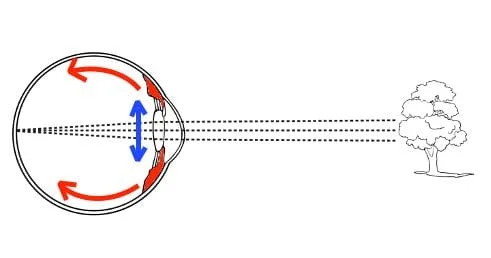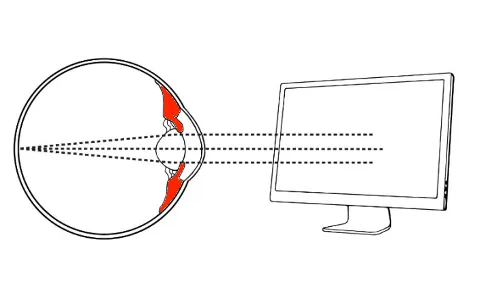Before we share with you natural remedies for improving eye health and vision, we need to stress the importance of having an eye doctor on your health care team.
If you are noticing a change in your vision, sometimes the damage has already been done. That is why it is imperative that you have a yearly check up with an eye doctor to check the health of your eyes. An ounce of prevention is worth a pound of cure.
Most people know that computers are bad for the health of your eyes, but do you know why? We will explain below,
Did you know you can prevent
the degeneration of your eyesight?
There are eye exercises you can do.
There has been a time tested exercise regimen, called the Dr. Bates Method. We have links below.
There are special glasses you can wear.
Did you know there are glasses you can wear to help prevent the damage the light from screens cause your eyes?
Glasses that filter out the blue light not only helps your eyes, but helps prevent the artificial light from messing with your circadian rhythm (your sleep/wake cycle). For more on this,click herecheck out our webpage on INSOMNIA.
Did you know some sunglass types can make you more prone to cataracts while others prevent cataracts? Sunglasses without UV protection will decrease the light, so your eyes will dilate, allowing for more damaging UV light to enter your eyes. Make sure your sunglasses are UV protected!
There are activities you can avoid.
How Staring at a screen causes early deterioration of eyesight.
Staring at any object the same distance from your eyes causes fatigue of the little muscles in your eyes, which can result in headaches, and early deterioration of eyesight.
Have you ever known someone who took an office job and then rapidly had to buy stronger eyeglasses or start using “readers” or bifocals? This is why it is important to look outside and focus on a distant object repeatedly and regularly throughout the day.
Why? The lenses in our eyes are flexible, or “elastic,” changing as we focus on things at different distances from our eyes. Our eyeballs are naturally round, but our eyes have been designed to focus on items that are far away more often than nearby (to look out for food, shelter and predators in nature).
The eye is brilliantly designed to conserve energy while focusing far away. To flatten the lens in our eyes to see far, the tendons attached to the lens have to pull on the ends. Usually a muscle contracts to pull it's tendons tight, BUT unlike most muscles that contract to work, these ciliary muscles RELAX to pull their tendons tight. When we see far, the tiny muscles inside the eye (the ciliary muscles) RELAX back into the eye, pulling the fibers attached to the lens taut, flattening the lens (bending light less, so we can see far). That way to see far (which is important to stay safe in nature) the body has developed to be able to relax to see far.
Figure 1 - [eye (ciliary) muscles relaxing back deeper into the eye, pulling the fibers tight, flattening the lens, to bend light less, so we can see far]
To look at a nearby object (like a computer screen), the lens inside the eye has to round more to bend light more. The closer the object, the more the lens has to bend the light to keep it in focus. The little ciliary muscles have to contract to move forward to slacken the fibers that normally hold the lens in a flattened state (so we can see far without effort). The poor little muscles in our eyes need to CONTRACT so we can see the screen!
Figure 2 - [eye (ciliary) muscles contracting forward to relax the pull on the lens, allowing it to round to bend light more so we can see near]
As we age, the lens becomes less elastic, and that is why most elderly people lose their ability to focus nearby. Now we are finding people losing this ability at an earlier age because they look at screens too close to their eyes for too long. When you look near and far repeatedly, this gets the lens to round and flatten, keeping it pliable. If you keep the lens round, it loses it's elastic quality. Worse, people are losing the ability to see far as well, from staring at computer screens for years, as the lens looses its ability to flatten out. Again, if you don’t use it, you lose it!
Plus, if you keep a muscle in a contracted state, it makes more metabolic waste, and occludes the flow of blood in and lymph out. Can you see how this too can negatively impact the health of the eyes, and lead to degenerative conditions like glaucoma?
So alternating looking near and far will help keep the lens of the eyes malleable.
We should also think about the muscles outside the eye. These muscles are responsible for moving the eyeball around, and they have to remain in their contracted/working state to hold the eyes still, so we can focus on a spot on the screen.
Muscles were not designed to stay in a contracted state for hours at a time. They rely on movement to encourage fluid flow, bringing nutrients in and carrying waste away. Without this movement, the muscle strain as their own toxic metabolic waste pools around and within them, irritating the surrounding nerves, causing eye pain.
Worse, holding your eyes still to focus on a computer screen all day will cause the tight muscles to shorten over time, and the stretched out muscles looser over time. This can literally change the shape of your eyeball, negatively impacting your eyesight!
The muscles controlling the movement of the eyeballs needs to remain flexible and strong enough to move your eyes so they can better look around, follow moving objects and focusing the eyes on the object (else you may develop double vision).
Importance of Blinking:
Another reason to look at distant objects throughout the day is that focusing on objects far away also causes our eyelids to reflexively blink more frequently. When you look at something close, the natural blink rate slows down, as you are concentrating intently at what you are looking at, and, however briefly, blinking interferes with vision and concentration.
Blinking helps distribute wet tears over the eyes. Without frequent blinking, your eyes are at risk of drying out. Many people already suffer with dryer eyes, be it because of wearing contact lenses or having conditions like Sjorgen's syndrome.
Staring closely at a screen can make this much worse, even to the point of causing eye pain (yet another pain in the head), and negatively impact the health of your eyes.
Fun fact, there are three types of tears.
Basal tears: These tears lubricate the eyes so they don’t dry out. - Reflex tears: These waterier tears remove irritants. When you cut an onion, you cry reflex tears, which remove the irritating chemical that is released with the cutting action.
- Psychic tears: These tears are due to emotional stressors (both extreme happiness and sadness) and are full of stress hormones.
Can you see how letting yourself cry helps your overall health by helping your body eliminate excess stress hormones...
I hope all these reasons, have convinced you to take time throughout the day to look out a window (or better, to go outside) and focus on objects at varied distances toward a distant horizon. Look up, down, right, left, make circles with your eyes. Keep the muscles that move your eyes balanced and strong. Make a point to take a vision break every hour or so. Your eyes and brain will thank you over time!
Bates Method -
a specific exercise regimen
for the health of your eyes.
If you want to learn the Bates Method (a specific exercise regimen) to help correct your vision, watch:
For a "follow along" exercise video, check out:
There are supplements you can take to help the health of your eyes and improve vision
Vitamins are imperative for the health of your eyes, but did you know some vitamins are BAD for not just your eyes, but bad for YOU!?!
Many vitamins are synthetically man made, and though are very similar to plant based vitamins, the subtle differences cause harm to our bodies, including our eyes.
To learn more about vitamins, CLICK HERE (VITAMINS - WHAT YOU SHOULD KNOW).
If you are looking for supplements, but unsure which one to pick, check out https://us.fullscript.com/welcome/drummond

TO COMBAT AGING Eyes, YOU NEED TO
MOVE WELL, SLEEP WELL AND EAT WELL
To learn more about how we treat here at Drummond Chiropractic, CLICK HERE.
To go back to our home page, CLICK HERE.
Why wait?
to schedule an appointment.
Drummond Chiropractic, LLC
Best Chiropractors in Bloomington
565 N Walnut St
Bloomington, IN 47404
(812) 336 - 2423





